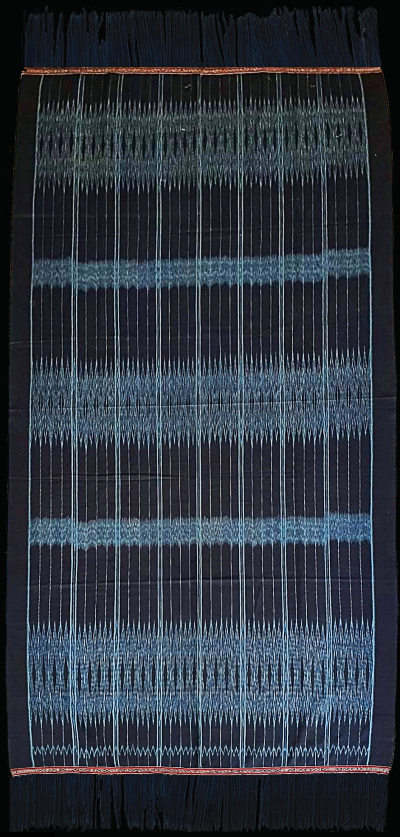| |
 
 | | | |
340 Sumatra, Batak
Ulos (shawl)
| | | Period: | Early 20th c. | | Yarn: | Cotton, hand-spun, fine | | Technique: | Warp ikat | | Panels: | 1 | | Design: | Ulos suri-suri with three wide bands of ikated motifs, and two narrower bands, presumably of the type called si tolu tuho. Fine geometric patterns, arrowheads and elongated rhomboids, executed in pale blue on indigo. Finely woven transverse border. | | Comment: | [PHOTOGRAPHY PROVISIONAL] An older ulos, of the type suri-suri, which would be an appropriate gift to a mother on the birth of a child. Good example on account of its tight weaving and saturated tones. Gillow identifies this type as ulos sibolang, used as head-dress by widows. Due to minute distinctions between types of ulos, differentiated not just by design but also by intended use, and the great complexity of the adat, exact identification is not always be possible without help from a regional expert. Acquired by private donation. | | Background: | Chapters on Sumatra and Batak. | | Compare: | 146 174 203 057 252 | | Sources: | Very similar ulos (identified as suri-suri) in Kahlenberg c.s., Textile Traditions of Indonesia, Fig 1. Similar example, with five ikated bands, identified as si lima tuho in Niessen, Legacy in Cloth, Cat 1.1.1c. Similar ulos, though with markedly less definition in Asian Art Museum, San Francisco, Object ID 1991.196. Similar ulos in Australian Museum, Object E85844. Similar cloth depicted in Gillow, Traditional Indonesian Textiles, Fig. 110. Another similar cloth in Leigh-Theisen and Mittersakschmoëller, Lebensmuster, Abb. 95. See also Khan Majlis, Wege zu Goettern und Ahnen, Fig. 49. | | |

©Peter ten Hoopen, 2025
All rights reserved.
|
|


